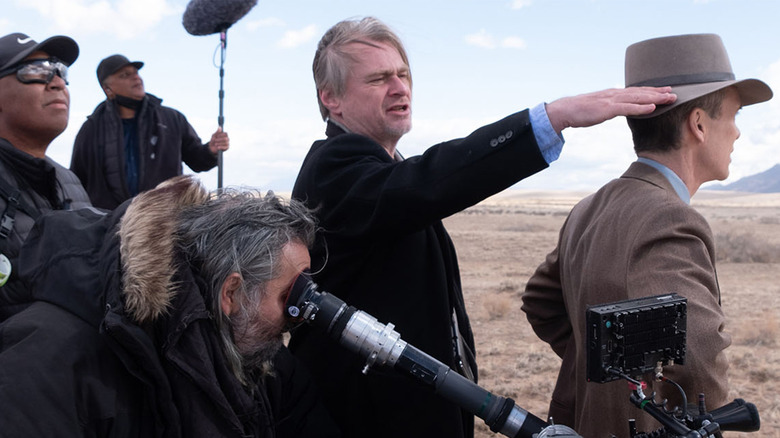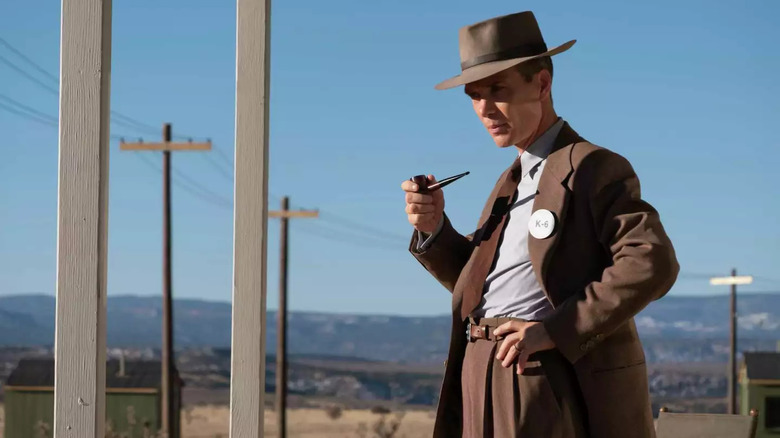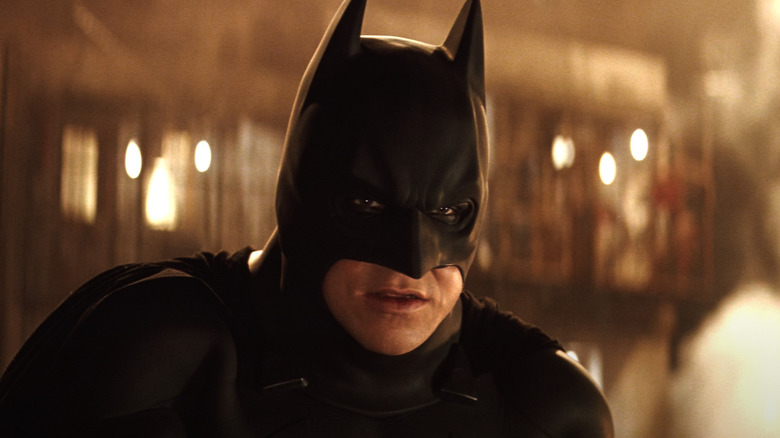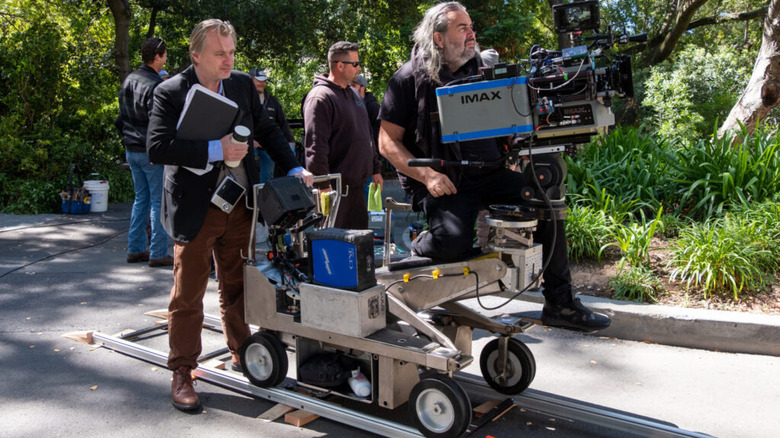Why Christopher Nolan Doesn't Like Recording Commentaries (And Why He Should Anyway)
Where would we be without the good old director's commentary? We certainly wouldn't have Ben Affleck relentlessly mocking "Armageddon" or David Fincher relentlessly mocking Ben Affleck in the "Gone Girl" commentary. I wouldn't have wasted countless hours as a teen learning every intricate detail of how each individual episode of "The Simpsons" came to together, and we wouldn't have had the feature-length apology that was Joel Schumacher's director's commentary for "Batman & Robin."
Of course, these commentary tracks aren't just arenas for filmmakers to make fun of actors and apologize for their blunders. Fincher's commentaries are frequently insightful in a way that a straightforward interview couldn't be. Likewise, Adam McKay has turned the commentary itself into an artform, putting almost as much care into constructing his elaborate audio tracks as he does his films.
But there's one filmmaker who has consistently robbed us of the commentary experience ever since 2005. Christopher Nolan is surely one of the most thoughtful and erudite filmmakers working today, so his insights would no doubt prove interesting to film nerds worldwide. But after his 2002 effort "Insomnia," every Nolan movie has arrived sans commentary track, beginning with 2005's "Batman Begins."
At the time, the "Oppenheimer" director told Scott Holleran, "I hate doing commentaries," citing his view that "the movie's not finished until it's in front of an audience." That evidently made him feel awkward commenting on the film before the audience had a proper chance to see and react to it. But there's a lot more to it than that, with Nolan revealing to /Film that he actually finds the process of recording the tracks quite taxing.
'The tyranny of time'
/Film's Bill Bria spoke with Christopher Nolan for the home entertainment release of "Oppenheimer" where he asked him about his aversion to commentary tracks. Bria cited the fact that Nolan actually did record a commentary for his breakthrough effort "Memento," even injecting some creativity into it by recording multiple endings. But it seems the director's feelings about the whole thing haven't changed much since "Batman Begins" back in 2005. Asked whether we can expect another commentary track in the future, Nolan said:
"I mean, I would never say never, but even when you do it, they tend to cut it together from multiple takes, because you lose sync with the material."
The director cited this problem of having to try to keep pace with his own films during commentary tracks as the main issue holding him back from recording more, referring to "the tyranny of time as running through the projector" making it difficult to "say all the appropriate things as your movie unspools at 24 frames a second." Nolan claimed that, for these reasons, recording a commentary track is "pretty punishing," and "not always the best way to approach the film."
The revered filmmaker is known for his famously cerebral approach to his movies, which can sometimes get lost in their own complexity — as was the case with 2020's "Tenet" which no one, including Quentin Tarantino, could understand. That is to say that Christopher Nolan has a lot going on in that noggin of his, so you can imagine he would have a hard time recording all his sophisticated thoughts properly while having to keep pace with his own films.
If anyone should do a commentary ...
Even if you're not a fan of Christopher Nolan's films, you've still gotta admire the man's intellect, which has yielded not only some of the most compellingly thoughtful films of recent years, but also some of the more interesting press tours, with the director always offering some insightful comments on his work. What's more, you've gotta respect the guy's film knowledge and passion for the art-form, which was on full display during a recent episode of "Dans le Vidéo Club." In the video, he and "Oppenheimer" star Cillian Murphy prove their movie buff bonafides by making some tasteful picks from the archives and speaking eloquently about them all, with Nolan in particular talking about some overlooked classics and the various 35mm prints he occasionally "puts up" at home.
As such, it really is a shame we haven't had a Nolan director's commentary since 2002, especially when it comes to his more misunderstood or complex films. Imagine a commentary track for "Tenet," in which he lays out his thought process for the whole thing. Perhaps we'd suddenly realize we were wrong about it the whole time. At least Tarantino might finally be able to understand it.
There's also the fact that Nolan never goes into a movie without having some sort of perspective or point to make. He took on the Batman franchise precisely because he saw a way of making a movie about the character that hadn't been done — specifically grounding the Dark Knight in a cinematic reality. Nolan referred to this "cinematic reality" as distinct from actual reality in a behind-the-scenes featurette for the movie. But it would be fascinating to hear him expound on that concept in a commentary track, especially relating it to specific scenes as they happen.
There's still hope
As much as we'd all like to hear a full Christopher Nolan commentary for "Oppenheimer" and his other films, it seems for now the director is more focused on other ways of providing us with an insight into his movie-making process. As he told /Film, "Some of the earlier commentaries we tended to do as a scene by scene version, if you like, particular scenes we honed in on." That's no different with the home release of "Oppenheimer," which comes with more than three hours of special features on the 4K Blu-ray release consisting of documentary-style features.
But it doesn't look like all hope is lost when it comes to future Nolan commentary tracks, with the director adding, "It does mean that [commentaries] tend to have more of a life, because they get stuck on an extra audio track in different subsequent releases." A film buff like Nolan is clearly aware of the benefits of a director's commentary, so we might well see something from him in the future. In the age of YouTube, though, it's not as if there's a lack of interviews, featurettes, and behind-the-scenes clips to give us a sense of how Nolan makes his movies. For now, we'll have to make do with that until the director decides to grace us all with some official commentaries.



